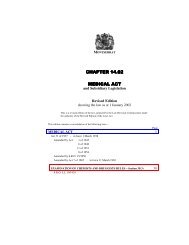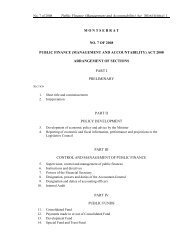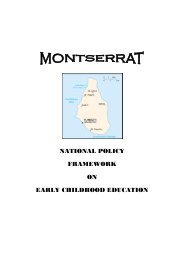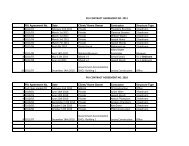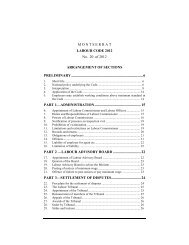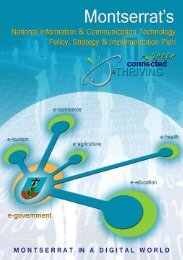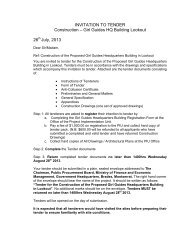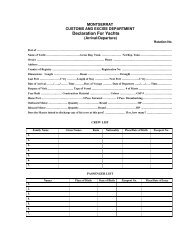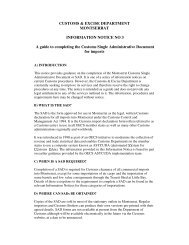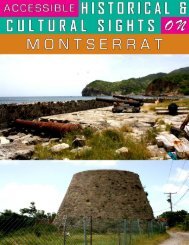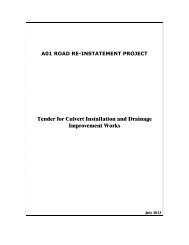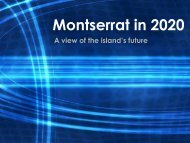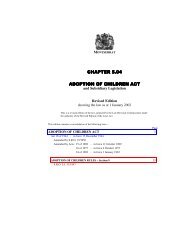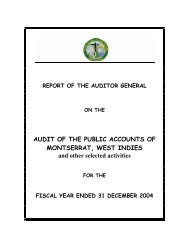Montserrat Survey of Living Conditions (MSLC) Executive Summary
Montserrat Survey of Living Conditions (MSLC) Executive Summary
Montserrat Survey of Living Conditions (MSLC) Executive Summary
You also want an ePaper? Increase the reach of your titles
YUMPU automatically turns print PDFs into web optimized ePapers that Google loves.
<strong>Montserrat</strong> <strong>Survey</strong> <strong>of</strong> <strong>Living</strong> <strong>Conditions</strong><strong>Executive</strong> <strong>Summary</strong>maintenance and extending networks to the few areas with inadequate service. Grants from CDB’s BNTFprogramme are being used for this purpose and to provide small scale community facilities.4.9 NGOsA number <strong>of</strong> NGOs (e.g. the Red Cross, the Old People’s Welfare Association, the Red Cross and thechurches) provide services to very poor individuals and families. There are also several immigrantassociations, most <strong>of</strong> which concentrate on providing advice and guidance, and putting on social andcultural activities. Two general comments can be made about these activities:the overall impression from the PPAs is that the services that these organisations provide arewelcomed by their beneficiaries.these organisations are operating on a shoestring through donations and voluntary services. Thelack <strong>of</strong> funds is therefore a major constraint on the extent <strong>of</strong> services that they can provide andtheir ability to cater for the current level <strong>of</strong> demand.In summary, the NGOs/ CBOS, know what they are doing, are doing the ‘right’ thing, but are unable toprovide the extent <strong>of</strong> assistance that they would like to. In this sense they are in a similar position to SWDand CSD whose operations are also heavily constrained by financial restrictions.4.10 OverviewThe scale <strong>of</strong> the destruction caused by the volcanic eruptions required the complete re-construction <strong>of</strong>social, physical and community infrastructure and systems in the safe zone. These programmes have beensuccessful in that basic infrastructure provision is now almost universal and social welfare, education andhealth services are all re-established.Attention is therefore shifting to issues related to the quality <strong>of</strong>, access to, and financing <strong>of</strong> these services.Most <strong>of</strong> these issues are already appreciated and policies and programmes to address them are beingimplemented, including several which are designed to directly benefit poor and vulnerable households.Several <strong>of</strong> these have been formulated or implemented in the last 12 months. Examples are social welfareservices and housing for the elderly and the disabled, education programmes for low achieving anddisruptive pupils, public awareness campaigns to address social issues such as drug-taking, antisocialbehaviour, domestic violence and child abuse. These initiatives are supplemented by a number <strong>of</strong> localNGOs, sometimes part-funded by overseas donors.The key issue is thus not so much one <strong>of</strong> an absence <strong>of</strong> relevant programmes but rather one <strong>of</strong> resourcing.In virtually every case, progress is hampered by insufficient funds and manpower. This situation has beenexacerbated by the current economic and fiscal contexts which have led to both an increasing demand forservices and are putting pressure on the funds available to address them.In this context, the way forward is to identify innovative approaches to these issues and to prioritisebetween the policies and programmes that have already been proposed in the MSDP and by theimplementing agencies concerned, <strong>of</strong>ten very recently. Given the likelihood that a significant increase infunds is unlikely in the short- or medium-terms, this puts a premium on identifying recommendations thateither do not have major financial implications or have the potential to attract donor funding.<strong>Montserrat</strong> Country Poverty Assessment, Final ReportHalcrow Group Limited, July 2012.ES21



